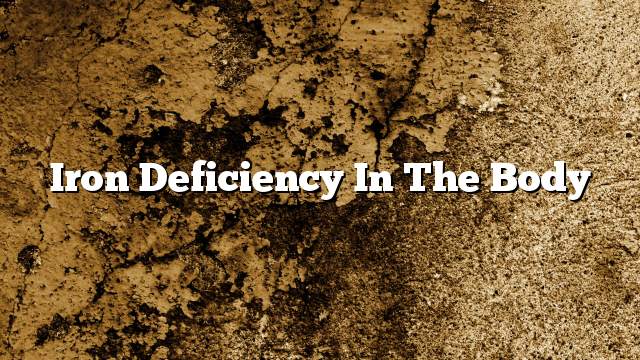Iron deficiency in the body
The important element of iron in the human body is that it is responsible for the production of red blood cells, which contain in their composition the hemoglobin, which is responsible for transporting food and oxygen to all the cells and tissues of the body, so that it can perform its functions properly, but there are some people who suffer from Problems in the amount of iron in their bodies, which results in some of the problems that affect human health.
Causes of iron deficiency
There are a variety of causes that lead to iron deficiency of the body, namely:
- This is due to a number of reasons, including the exposure of a person to a particular accident and injury or bleeding, or the birth of pregnant women, in the period of menstruation or puerperal, in addition to the continuous donation of blood to hospitals or clinics, in addition to the existence of certain diseases, : Swelling of the colon, bleeding in the digestive tract, or internal bleeding, it is known that the blood contains iron, blood loss leads to iron deficiency.
- Eating iron-containing foods is not enough. Neglecting iron-containing foods such as vegetables and meat may lead to a deficiency. Iron deficiency and iron deficiency may be high in people who rely on a vegetarian diet. Although there are some types of vegetables And legumes that contain iron, but the body does not absorb the iron found in it as absorbed in meat or fish.
- Problems with the process of absorption of iron in the body, and this may be due to a problem in the intestine as infected with celiac disease, which inhibits the ability to absorb the iron element specifically from digested food, or may be due to the removal of part of the intestine.
Symptoms of iron deficiency
There are some symptoms that people with iron deficiency feel:
- The feeling of fatigue and exhaustion, due to lack of oxygen access to the cells and tissues of the body, which leads to loss of energy.
- The inability to focus or think well.
- The red cheeks and pink skin result from the blood flow to the arteries and blood vessels in them, and therefore lack of iron makes them dim color, and it affects the color of lips and eyelids and even gums.
- Difficulty breathing when doing some simple activities, such as walking or climbing stairs.
- Problems in the heartbeat, lack of oxygen, lead to a lack of energy in the body, and thus irregular pulse.
- A person with iron deficiency may have long standing problems because he may have an inflammation of the nerves of the foot.
- Headache and headache.
- Iron deficiency will also affect the nervous system, as it will not get enough oxygen, so a person may feel depressed or tense without any reason.
- The iron deficiency patient will notice that his hair is starting to weaken and fall.
- The occurrence of gastrointestinal disorders, specifically in the colon, intestines.
- Inflammation of the tongue, and sometimes muscle pain.
- The occurrence of thyroid problems, which will affect weight, body temperature.
- The presence of pain in the chest area.
- Sleep disorders and problems.
- Loss of consciousness and dizziness.
Diseases related to iron deficiency
Of diseases that are directly related to iron deficiency:
- Anemia, or anemia.
- Heart-related diseases, which may be either cardiac hypertrophy, damage or failure.
- Iron deficiency in pregnant women may lead to premature birth.
- Children with iron deficiency have problems with physical growth, as well as inflammation.
Treatment of iron deficiency
- Check the cause of iron deficiency in the body, and if the problem is organic, it should be treated according to the doctor’s instructions.
- Take care to eat foods rich in iron, or take supplements.
- Take care to eat foods that contain vitamin C, because it stimulates the process of absorption of the iron element in the body.
